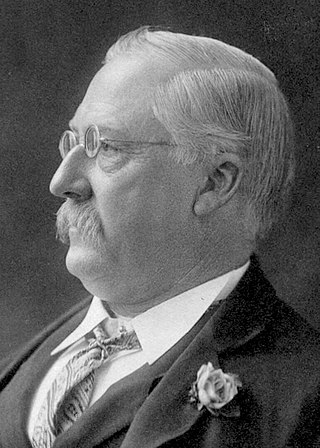
Sir George Turner was an Australian politician. He served two terms as Premier of Victoria, holding office from 1894 to 1899 and 1900 to 1901 as a liberal. After Federation he was invited by Edmund Barton to join the inaugural federal ministry, becoming the first Treasurer of Australia. He held office until 1904 under Barton and Alfred Deakin, then a few months later resumed office under George Reid. The government fell in 1905 and Turner retired from politics at the 1906 election.

Sir James McCulloch, was a British colonial politician and statesman who served as the fifth premier of Victoria over four non-consecutive terms from 1863 to 1868, 1868 to 1869, 1870 to 1871 and 1875 to 1877. He is the third longest-serving premier in Victorian history.
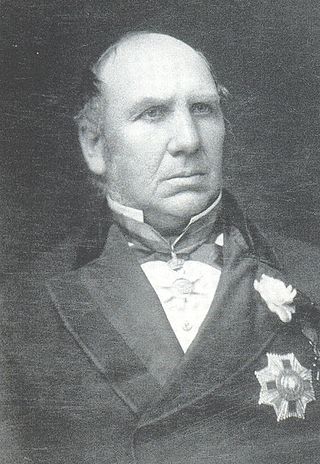
Sir John O'Shanassy, KCMG, was an Irish-Australian politician who served as the 2nd Premier of Victoria. O'Shanassy was born near Thurles in County Tipperary, Ireland, the son of a surveyor, and came to the Port Phillip District in 1839. He went into business in Melbourne as a draper, and by 1846 he was rich enough to be elected to the Melbourne City Council and to become the founding chairman of the Colonial Bank of Australasia. By the 1850s he was a major landowner and one of the wealthiest men in the colony. He also became a recognised leader of the large Irish Catholic community.

James Goodall Francis, Australian colonial politician, was the 9th Premier of Victoria. Francis was born in London, and emigrated to Van Diemen's Land in 1847, where he became a businessman. He moved to Victoria in 1853 and became a leading Melbourne merchant. He was a director of the Bank of New South Wales and president of the Melbourne Chamber of Commerce. He married Mary Ogilvie and had eight sons and seven daughters.
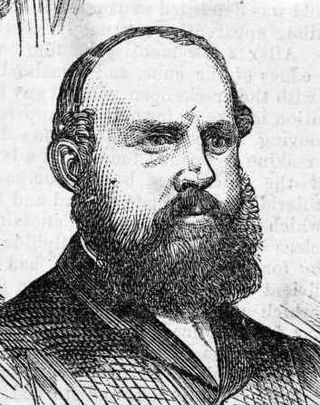
George Briscoe Kerferd, Australian colonial politician, was the 10th Premier of Victoria.
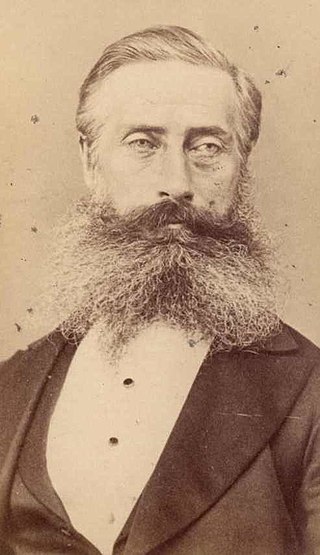
Sir Graham Berry,, was an Australian colonial politician and the 11th Premier of Victoria. He was one of the most radical and colourful figures in the politics of colonial Victoria, and made the most determined efforts to break the power of the Victorian Legislative Council, the stronghold of the landowning class.
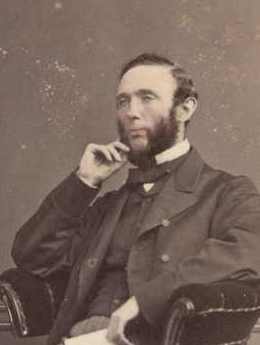
James Service, an Australian colonial politician, was the 12th premier of Victoria, Australia.

James Macpherson Grant was an Australian solicitor who defended the Eureka Stockade rebels and a politician who was a member of the Victorian Legislative Assembly and the Victorian Legislative Council.
Charles Edwin Jones was an Australian politician, member of the Victorian Legislative Assembly 1864 to 1871 and 1886 to 1889.
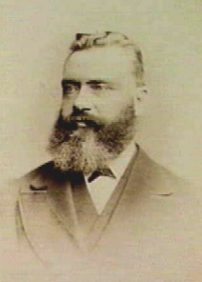
James Joseph Casey was a politician in colonial Victoria (Australia), a member of the Victorian Legislative Assembly almost continuously from 1861 to 1880 who also served as a judge of the County Court of Victoria and Victorian Land Tax Commissioner.

Francis Longmore was a politician in colonial Victoria, commissioner of railways and roads 1869 to 1870 and for Crown Lands 1875 and 1877 to 1880.

The 1877 Victorian colonial election was held on 11 May 1877 to elect the 9th Parliament of Victoria. It was the first election in Victoria in which all electorates voted on the same day. All 86 seats in 55 electorates in the Legislative Assembly were up for election, though four seats were uncontested.

The July 1880 Victorian colonial election was held on 14 July 1880 to elect the 11th Parliament of Victoria. All 86 seats in 55 electorates in the Legislative Assembly were up for election, though eight seats were uncontested.

The 1874 Victorian colonial election was held from 25 March to 22 April 1874 to elect the 8th Parliament of Victoria. All 78 seats in 49 electorates in the Legislative Assembly were up for election, though eleven seats were uncontested.

The 1868 Victorian colonial election was held from 21 January to 20 February 1868 to elect the 6th Parliament of Victoria. All 78 seats in 49 electorates in the Legislative Assembly were up for election, though seven seats were uncontested.

The 1866 Victorian colonial election was held from 30 December 1865 to 29 January 1866 to elect the 5th Parliament of Victoria. All 78 seats in 49 electorates in the Legislative Assembly were up for election, though ten seats were uncontested.

The 1864 Victorian colonial election was held from 5 October to 3 November 1864 to elect the 4th Parliament of Victoria. All 78 seats in 49 electorates in the Legislative Assembly were up for election, though sixteen seats were uncontested.

The 1861 Victorian colonial election was held from 2−19 August 1861 to elect the 3rd Parliament of Victoria. All 78 seats in 49 electorates in the Legislative Assembly were up for election, though four seats were uncontested.

The 1859 Victorian colonial election was held from 26 August to 26 September 1859 to elect the 2nd Parliament of Victoria. All 78 seats in 49 electorates in the Legislative Assembly were up for election, though eight seats were uncontested. This election was the first held in Victoria after the electoral rolls were compiled according to the principle of manhood suffrage.

The 1856 Victorian colonial election was held from 23 September to 24 October 1856 to elect the first Parliament of Victoria. All 60 seats in 37 electorates in the Legislative Assembly were up for election, though eight seats were uncontested. The eligibility to vote at the 1856 Victorian election was subject to a property qualification. The voting was carried out by secret ballot.













